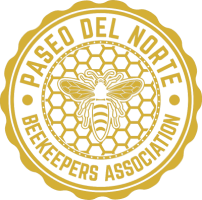New Beekeeper Tips: 10 Things to Consider Before Getting Started
Thinking about starting your beekeeping journey? Before you dive in, here are 10 essential tips that will help set you up for success as a new beekeeper.
Join Your Local Club
There are many local beekeeping clubs throughout New Mexico and West Texas that can be wonderful resources for new beekeepers. Local clubs generally meet once a month with informative speakers and opportunities to network with beekeepers of all experience levels. The connections you make through your local club are invaluable as you begin your journey as a beekeeper.
Find a Mentor
Beekeeping is best learned by getting hands-on experience, and finding a mentor is the ideal way to prepare yourself for managing your own hives. Your local club is a great place to find a mentor, but you may already have a beekeeping hero who has inspired your interest in this fascinating hobby. Since there are different philosophies in beekeeping, ensure that your mentor’s practices align with what you’re comfortable with.
Check with Your Neighbors
In New Mexico and Texas, there are no laws against keeping bees in your yard, but if you live in a neighborhood with a homeowners association, there may be restrictions. Even if there are no guidelines, it’s good practice to talk to your neighbors before setting up hives. This opens the door to discussing the benefits for their yard and ensures positive communication in case any issues arise. Also, check with your city regarding any restrictions, hive registration, or regulations.
Find a Workshop or Class to Learn the Basics
There are many workshops and certification programs throughout the state that offer intensive training over the course of a day or two. Find details about available programs here and on this website. PDNBeekeepers offers an Introduction to Beekeeping class starting in February. Be sure to add the NMBKA Winter and Spring conferences to your schedule, as they provide educational speakers and classes, along with networking opportunities with beekeepers from across the state.
Expect an Investment of Time and Money
There’s a joke that there’s definitely money in beekeeping — in what you spend on bees, hives, tools, treatments, and more. The good news is that there are various ways to source equipment and bees, so you can be as frugal as necessary. Your local club and mentor can help you explore options in your area. While financial investment can vary, the time investment is crucial for the success of your hives. Plan ahead to ensure you can meet your bees’ needs.
Start with Two Hives Instead of One
Starting with two hives significantly increases your chances of success! If something goes wrong with one hive, the second hive can serve as a backup. For example, if the queen in one hive fails, you can pull eggs from the other to help rear a new queen. If one hive is weak, you can strengthen it by sharing resources from the stronger hive. These are just a few ways having two hives can improve your beekeeping experience.
Hives Can Fail, No Matter How Well You Do
Bees face many hazards, and even the most experienced beekeepers can lose hives. Mites, beetles, pesticides, and unusual weather patterns are just a few challenges. Staying informed about local issues through your club or mentor can help, but remember that even the best beekeepers sometimes lose hives — don’t be discouraged if it happens to you.
There Are Multiple Answers to Every Beekeeping Question
There are various philosophies, traditions, and innovations in beekeeping, so it’s common to hear different answers to the same question. It’s important to do your own research and gain experience to determine what works best for you. Trust your instincts when deciding which advice feels most helpful.
You Will Always Be Learning
No matter how long you keep bees, there will always be new discoveries. The best beekeepers know that they are always learning, and new research continuously provides insights to improve your beekeeping success. If you feel like a novice, take comfort in knowing that we are all learning as we go.
Get Ready to Enjoy the Benefits
The benefits of adding bees to your landscape will likely show up long before your first honey harvest. While you may need to wait until the second year to harvest substantial honey, you’ll enjoy other perks much sooner. Bees will help pollinate the flowers, trees, fruits, and vegetables in your yard as soon as they settle in, and the joy of observing their habits is priceless.

